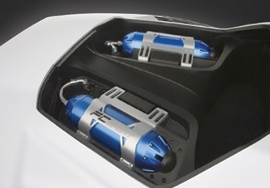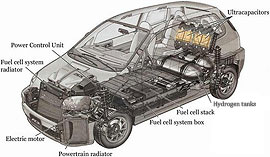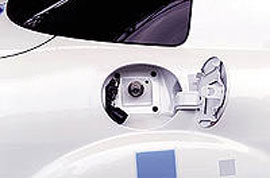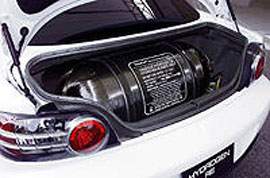TK-AXHFT Anti-Explosion Hydrogen Fuel Tanks
Auto Hydrogen Fuel Tanks

Our new specially designed Hydrogen tank can provide you with enhanced mileage (100 miles or 61 kilometres can be covered with just 8 ounces of hydrogen gas); cheaper and cleaner fuel whilst ensuring that your fuel tank will not explode.
What is Hydrogen?
Hydrogen is a highly flammable chemical element which occurs in great abundance throughout the universe. In fact, hydrogen makes up approximately 75% of the universe, by volume, and it appears in a very large number of compounds, especially those which make up various organic materials. Many people are familiar with hydrogen as a potential fuel source, thanks to its promotion as a potential alternative fuel, and all of us consume hydrogen every day, in the water we drink and the foods we eat.
Hydrogen is a unique standalone element, not classified with any other elements. Many scientists think of hydrogen as a kind of elemental building block, since its simple structure is the basis of so many things. The colourless, highly flammable gas has a number of industrial uses, especially in the refining of petroleum products.
Why use Hydrogen?

Hydrogen fuel has been proven to provide enhanced mileage with a vehicle today easily able to cover 100 miles (61 kilometres) in just 8 ounces of hydrogen gas. The engines which are present within these vehicles convert the chemical energy of hydrogen gas into mechanical energy.
In addition to the above and apart from being a lot more cost efficient, hydrogen gas also has been found to improve a vehicles efficiency and horsepower, thus providing a 100% guarantee that the tank will not explode would mean Techno Kontrol can redefine the transport industry.
Finally, the low cost in converting your existing vehicles engine so as to be able to use hydrogen gas is both inexpensive and very easy to do, however we recommend that you contact us for further information on how to convert your vehicles engine with a Techno Kontrol approved Hydrogen Engine.
Is Hydrogen Fuel Safe?
In many cases, hydrogen is safer than the fuel we currently use to power our vehicles. Carbon-based fuels tend to spread as liquids (as we all know if we´ve ever spilled petrol/diesel on ourselves at the station).
When it burns, conventional fuel produces a hot ash, creating radiant heat. This isn't the case with hydrogen. In its pure form, hydrogen burns no carbon and produces no hot ash and as a result very little radiant heat [source: RMI].
What's more, when hydrogen leaks, it ascends rapidly into the atmosphere, so it has less time to burn [source: Princeton] whereas Petrol vapours always descends to the ground (hence why it is illegal to smoke at the petrol station as the fumes on the ground could potentially catch fire).
Why do people fear Hydrogen as an alternative fuel?

One word explains why people fear hydrogen and that word is “Hinderburg”. The Hindenburg airship exploded in 1937 and out of 97 people onboard, 36 died (35 people jumped to their deaths and one died on the ground) within the accident.
Both proponents and opponents of hydrogen fuel have latched onto the ill-fated blimp in their debate. While opponents point to it as a cautionary tale, proponents view it as exoneration for hydrogen.
Although the hydrogen aboard the Hindenburg certainly did burn with incredible force, it wasn't the hydrogen that created the disaster -- it was an aluminium powder. To reflect sunlight, the skin of Hindenburg was covered in this powder, a form equivalent to rocket fuel [source: RMI].
And the cotton fabric that made up the blimp's skin was waterproofed with highly flammable acetate [source: ABC]. Hydrogen proponents also point out that the flames in the Hindenburg disaster burned upward rather than out because the element is so lightweight.
The challenge presented by hydrogen fuel storage is to come up with a way to create a storage tank that won't prove to be a cautionary tale against hydrogen for future generations.
In other words, what would make the best storage tank to prevent hydrogen from exploding in a car accident?

A Steel tank is one possibility as they are strong enough to serve as reliable carriers for hydrogen gas in automobiles and if an accident does occur, a steel tank will likely be able to withstand an impact without suffering a puncture or rupture.
The only real problem with a steel tank however is that it is hydrogen is so lightweight and therefore less dense than gasoline. Therefore any tank that holds pressurized hydrogen fuel would have to be much bigger than the conventional gas tank on your car. A steel tank would be pretty heavy and reduce energy efficiency. Thus would rule out any advantage of using a hydrogen fuel tank over that of a petroleum one.
Therefore one realistic possibility is that to use a tank made of polyethylene as they are much more lightweight and can be shaped to fit ahead of what´s known as the vehicles “Crumple Zone”, thus both the vehicle and its fuel tank will be able to absorb the energy of an impact.[source: Princeton].
Thus if the world is really running out of oil, human beings are going to have to put aside any fears of using hydrogen based fuel tanks, however in doing so and in purchasing our specially designed Techno Kontrol product, we can promise that we will provide our clients with the first anti explosive; fire proof; heat resistant hydrogen fuel tank the world has ever seen.
Techno Kontrol Transportation & Auto Industry
Seattle Fire Dept. Auto Gas (CNG) Cylinder Explosion Report
When people say fibre made auto gas cylinders never explode
Gas Cylinder Training Video
Metal Stress Related Studies in Gas Cyliders, Gas Tanks & Pipelines
- Study on corrosion resistance of gas cylinder materials in HF, HCl and HBr environments
- Evaluation of the effects of natural gas contaminants on corrosions in compressed natural gas storage systems
- Safe use of gas cylinders in marine service
- A case study for crack detection within a gas cylinder using acoustic emission testing
- Effects of water and gas compositions on the internal corrosion of gas pipelines
- Hydrogen cylinders and transport vessels
- Progress in improving cylinder gas purity
- Corrosion resistance of nickel-containing alloys in hydrofluoric acid, hydrogene fluorid and fluorine
CNG and Hydrogen Vehicle Fuel Tank Failure Incidents
Testing, and Preventive Measures
Video explosions
Videos
- Kuwaiti Fire Service/Civil Defense Live Government Tests
- Real live government demos (8 tests)
- Train explosion
- Car explosion
- Truck explosion
- Motorcycle explosion
- Cars on fire
Techno Kontrol Transportation
- CNG and Hydrogen Vehicle Fuel Tank Failure Incidents, Testing, and Preventive Measures
- Supersport Motorcycle Regulations (Spanish)
- FIM Road Racing World Championship Grand Prix Regulations (English - French)
Industries
- Petroleum Industry
- Construction Industry
- Transportation & Auto Industry
- Aviation
- Maritime
- Military & Security
TechnoKontrol Wikipedia

TechnoKontrol: 1st in Spain for own Technology patents 2013 & 2014

- Ministerio de Industria Turismo y Comercio-OEPM
Technokontrol, the number 1 corporation in Spain filing for its own technology patents, trademarks and utility patents (SPA) - OEPM 2013 The year in numbers (SPA)
TechnoKontrol has been fully verified and certified by Bureau Veritas

Certificates
- ISO 9001 - ES108784-1
- ISO 14001 - ES108782-1
- ISO 45001 - ES108783-1
- ISO 4126
- ISO 28000
- ISO 37000

NFPA-National Fire Protection Association
NFPA-Asociación Nacional de Protección contra el fuego
TechnoKontrol is a member of the NFPA

NFPA 69: Standard on Explosion Prevention Systems, 2016 Edition
Prevent deflagration explosions due to combustible dust particles, gases or vapors with NFPA 69. Combustible dust, gases and vapors produced in industrial settings can pose a significant safety hazard.NFPA 69: Standard on Explosion Prevention Systems offers definitive guidance on explosion protection and prevention systems.
ATEX - European Antiexplosive Safety Directives

- ATEX Guide: Protection in explosive atmospheres
- ATEX-EU/HAZLOZ-USA/NFPA-USA/DSEAR-UK/Explosion Directives TechnoKontrol Additional Anti-Explosion Data
- ATEX Directive in EU Directives
Dangerous Substances and Explosive Atmospheres Regulations - United Kingdom/ATEX

United Nations Economic Commission for Europe - UNECE - TechnoKontrol

- TechnoKontrol information for the UNECE BLEVE working group
Proposal transmitted by the governments of Spain and France
The European Parliament and The Council

Technokontrol's Products & Services are insured by

TK-Global Engineering - Where efficiency and reliability become a reality


USA Chemical Safety Board
An independent federal agency investigating chemical accidents to protect workers, the public, and the environment.
About the CSB
CSB Safety Videos
- Chevron Richmond Refinery Explosion
- Deadly Contact
- West, Texas Real Live Blast Damage Video
- Hot Work - Dupont Explosion
- Static Sparks Explosion in Kansas
- Danger of Flammable Gas Accumulation
Articles
- Energy Sector Vulnerabilities: Petroleum (Spanish)
